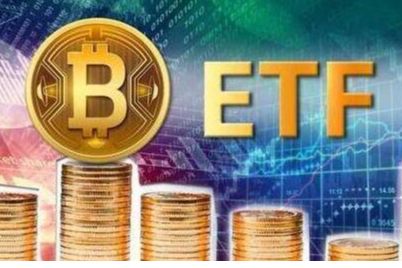After the approval of ETF, with the competition of ETF issuers for market share, it is expected that the marketing battle for Bitcoin will soon begin.
Author: Stratus Crypto
Translation: xiaozou, Golden Finance
The deadline for the SEC (U.S. Securities and Exchange Commission) to rule on the Ark21 ETF application is not far from January 10, 2023. Fund issuers are rushing to modify their S-1 documents to determine fees and authorized participant identities.
Most people in the cryptocurrency field believe that the SEC will approve all 13 applications to avoid a monopoly situation.
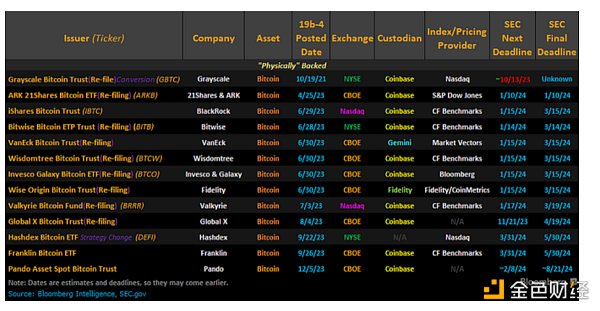
After the approval of ETF, with the competition of ETF issuers for market share, it is expected that the marketing battle for Bitcoin will soon begin.
On Christmas morning in 2023, John Reed Stark, former head of internet enforcement at the SEC, tweeted, "Based on my 20 years of experience at the U.S. Securities and Exchange Commission, it seems likely that the SEC will approve several Bitcoin spot ETFs." Recently, there have been a series of negotiation meetings between applicants and the SEC. Just a few weeks ago, he also commented that a 90% chance of approval is "absolutely absurd."
If the ETF is approved, only time will tell whether the expected $1 billion to $2.4 billion in funds will flow into the ETF.
1. How does a Bitcoin ETF work?
ETFs (Exchange-Traded Funds) hold stocks, bonds, commodities, and soon-to-hold assets such as Bitcoin in a "basket."
As early as 2013, the Winklevoss Bitcoin Trust Fund submitted the first Bitcoin ETF application, but over the years, dozens of other applications have been rejected along with that application.
The SEC is "reconsidering" Bitcoin ETFs, and a ruling in August 2023 stated that the SEC's rejection of Grayscale's initial application was unfair.
All of the submitted applications propose the establishment of a Grantor Trust, where Bitcoin will be stored by custodians such as Coinbase, similar to how physical assets such as gold for a gold ETF are stored in a vault. The trust will issue shares representing the "beneficial interest" of the custodian-protected assets (Bitcoin BTC).
According to the contract, authorized participants are the only ones who can interact directly with the ETF issuer in the process of creating and redeeming shares.
For example…
Retail investors (like you and me) place buy orders through our brokerage accounts to purchase a specific amount of a particular Bitcoin ETF (IBIT, HODL) on the secondary market through a listed exchange (NASDAQ). Brokers (JP Morgan, Robinhood) will redeem orders to authorized participants (AP, also known as institutional investors or market makers, such as Jane Street, Wintermute, BlueSky, etc.) on the primary market. These participants are "approved" (authorized and signed) to trade the underlying assets (Bitcoin physical delivery) or "cash creation" (cash settlement) in exchange for a certain number of ETF shares directly from the issuer (Blackrock, Ark21, Grayscale).
2. How do authorized participants make money?
Authorized participants (AP) are market makers approved by ETF issuers (BlackRock, Ark21, etc.) and play a role in creating and redeeming ETF shares in the investment process.
AP makes money in two ways: by selling products to brokers (JaneStreet) and selling to broker-dealers (Morgan Stanley) representing retail clients.
AP can execute trades (even after market close), create/redeem ETF shares through buying and selling orders to narrow the trading spread between the ETF price and the Net Asset Value (NAV), and provide liquidity in the market.
Since AP creates and redeems shares, the number of ETF shares available to the public is variable.
AP monitors the exchanges where we purchase ETF shares, deploys arbitrage strategies, and buys (creates) or sells (redeems) ETF shares to the ETF issuer/provider.
(1) If the Bitcoin ETF trades at a premium
If the market price (MP) is higher than the Net Asset Value (NAV), AP can purchase new shares from the ETF issuer in the primary market (at a discount). Typically, AP will short sell ETF shares and buy Bitcoin (BTC) from the exchange. AP will execute a "creation" trade with the ETF issuer, purchasing new "created" shares at a lower NAV. These lower-priced (newly created) shares are essentially a form of replenishment when sold to retail investors on the secondary market. The supply impact of new shares often leads to a drop in ETF share prices, bringing them closer to the ETF's Net Asset Value, providing profitable short-selling/arbitrage opportunities for AP.
The most common delivery methods between AP and ETF issuers are:
- Physical delivery: AP purchases Bitcoin (BTC) or uses its own BTC to trade with the ETF issuer for the underlying asset (BTC) to create new shares. Stock transactions do not incur capital gains tax because there is no cash involved in the transaction.
- Cash settlement: When AP sells BTC/other assets for cash or uses cash on hand to trade with the ETF issuer to create new shares. Capital gains tax is levied when buying and selling assets or shares with cash settlement.
(2) If the Bitcoin ETF trades at a discount
If the market price (MP) is lower than the Net Asset Value, AP can purchase ETF shares on the secondary market and then trade shares with the ETF issuer in the primary market to exchange for the ETF's underlying asset (Bitcoin), a process known as redemption.
As redemption reduces the supply of shares on the secondary market, the discount will decrease, and the share price trend will more closely align with its Net Asset Value.
- Physical delivery: When AP redeems "physical" (ETF shares for Bitcoin), the ETF issuer does not need to pay capital gains tax because there is no sale involved (it's an exchange). This cost saving can help retail investors maintain lower cost, as the ETF issuer achieves low costs and passes them on to retail investors.
- Cash settlement: When AP redeems shares for cash, AP's cash exchange usually incurs trading fees to offset the ETF issuer's cost of liquidating assets (BTC) from its portfolio. As redemption reduces the supply of shares on the secondary market, the corresponding discount will also decrease, and the share price trend will more closely align with the Net Asset Value.
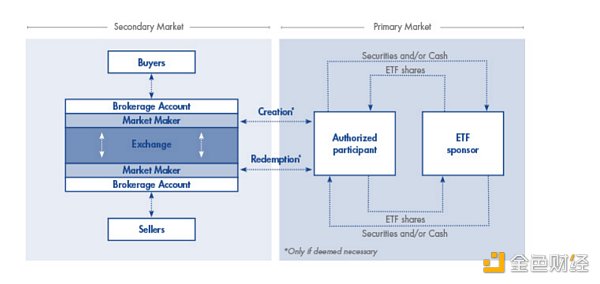
Here are two more specific examples that illustrate the role of AP in ETF investments.
Example 1: Creation of Bitcoin ETF shares (Investing in ETF):
Retail investors want to invest (purchase) a specific Bitcoin ETF worth $10,000, such as IBIT. If the spot price of BTC:USD is $40,000, and the trading price of the Bitcoin ETF IBIT on the market is $40,010, AP receives orders from the investors' brokers to trade (purchase) $10,000 worth of IBIT at the fair value of the ETF ($40,010). IBIT's trading price is at a premium of $10 compared to its net asset value, so AP's profit is $2.50, as in our example, the price of Bitcoin (underlying asset) is $40,000 (BTC:USD), and $10,000 is equivalent to 0.25 Bitcoin.
AP's profit is not the full $10 difference between the ETF spot and BTC spot, but rather ($0.25 x $10) = $2.50.
Example 2: Redemption of Bitcoin ETF shares (Closing out ETF):
When the ETF's trading price is $39,990 and the net asset value of the ETF is $40,000 (spot price of BTC:USD is $40,000), retail investors want to sell their $10,000 position.
In this example, the ETF is trading at a discount. AP (market maker) will initiate trades to purchase $10,000 worth of Bitcoin ETF shares (IBIT) and sell $10,000 worth of BTC (0.025 BTC) at the exchange rate of $40,000 BTC:USD, netting $2.50 ($0.025 x $10 = $2.50).
These numbers may sound small, but you have to consider the trading volume. AP is the intermediary between brokers and ETF issuers, just as brokers are intermediaries between retail investors (you and me) and AP.
- ETF issuers profit from the fees paid by AP, which are passed on to brokers and ultimately to retail investors like us.
- AP profits from arbitrage and charging fees to brokers.
- Brokers profit from charging fees or commissions. If AP charges a $7 fee/commission for a trade, a $1,000 trade can only purchase $993 worth of ETF.
3. Cash Settlement and Physical Delivery
Physical redemption is the standard procedure for ETFs. The SEC tends to favor cash settlement for Bitcoin ETFs, which has attracted issuers like Ark21 and Black Rock.
Black Rock recently modified its S-1 document, prioritizing cash settlement while retaining the option for physical delivery in the ongoing creation/redemption process.
AP delivers to the ETF issuer to create new shares, involving two delivery methods:
- Physical delivery: AP delivers the underlying asset (Bitcoin) to the ETF issuer. Bitcoin can be purchased on the market or come from AP's current Bitcoin holdings. Conversely, when AP redeems shares from the ETF issuer (BlackRock, Ark21, etc.), the issuer can also pay AP in Bitcoin. Physical delivery benefits AP with strategic Bitcoin reserves, whose cost is usually lower than the current BTC:USD spot price.
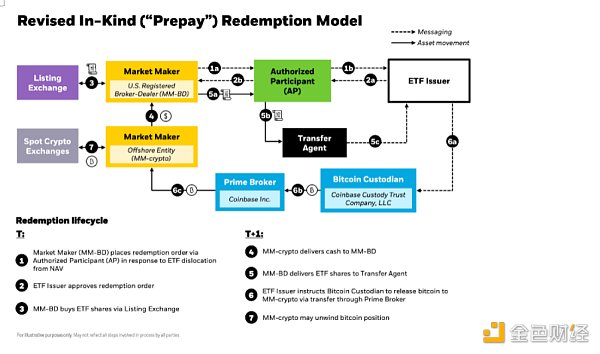
- Cash settlement ("cash creation"): Cash settlement, like a "prepayment," adds costs (fees and taxes), which are passed on to retail investors, making buying Bitcoin more attractive than buying ETFs. These costs include bid-ask spreads, calculation, execution, and accounting for operational costs involved in Bitcoin market exchanges. This may cause significant concerns for small APs and tilt their investment balance towards having trillions of dollars on the asset side of the balance sheet. The flowchart below is from a recent Blackrock document.
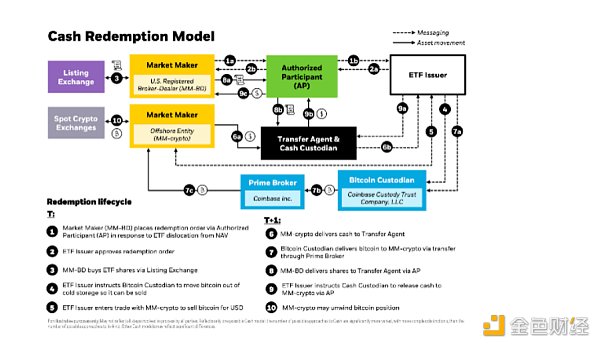
Due to deposit limits, banks are not allowed to hold Bitcoin until 2025, when the Basel Committee on Banking Supervision (BCBS) guidelines may allow holding up to 2% of cryptocurrency reserves.
Cash redemption requires AP to sell its ETF shares, incurring capital gains tax, and return the cash value to the ETF issuer instead of tax-free exchanging ETF shares for Bitcoin (BTC).
The SEC's motivation for adopting cash settlement may be due to pressure from banks, or they may not want brokers to handle Bitcoin transactions, as there is no FDIC or SIPC insurance to compensate for losses due to theft or mismanagement of deposits held in hot or cold wallets.
4. Cash Creation and Major Issues with Bitcoin
Let's assume 1 Bitcoin (BTC) = 1000 shares of ETF. If the spot price of Bitcoin is $45,000, then the spot price for retail investors to purchase 1 share of ETF (listed on NASDAQ) will be $45.
When authorized participants (AP) want to purchase (create) new ETF shares to fulfill trading orders, cash creation requires the issuer to receive cash from AP. Note that AP executes trades on behalf of the brokers (BD) representing retail investors (you and me), and neither the SEC nor FINRA has approved these brokers to trade spot Bitcoin assets.
In the cash creation model, the issuer will maintain real-time price quotes that AP needs to pay to create 1000 shares of ETF. Then, AP will trade with the issuer to create 1000 new shares at the issuer's quoted price.
There is a time delay between receiving cash and Bitcoin trading, resulting in a price difference. The longer the delay, the greater the risk for the issuer.
If the price of Bitcoin rises during this delay, the issuer will have to spend more money to purchase Bitcoin than what they received from AP. This negative cash balance for the issuer directly reduces the fund's net asset value, thereby reducing performance, and investors may choose ETFs based on performance.
If the issuer can purchase Bitcoin at a lower price than what they received from AP, they will have a positive cash balance and higher net asset value.
This situation will incentivize ETF (fund) issuers to price and quote higher than the market price, creating better performance by maintaining a neutral or positive cash balance.
ETF issuers' traders will be responsible for purchasing Bitcoin at the lowest average price possible using multiple exchanges (e.g., Coinbase, Kraken) and/or market makers (e.g., Jane Street, Wintermute) to lower their cost ratio.
Different ETFs may adopt different trading strategies and sources of liquidity, affecting ETF prices and costs.
For example, ARK21 is waiving a 0.25% fee for the first $1 billion of inflows for six months. BlackRock is offering a 0.2% fee concession for the first $5 billion of new funds for six months.
Retail investors will closely monitor this, and issuers with more efficient trading may ultimately become the big winners.
5. Several Issues with Bitcoin ETF
Over the past few months, ETF issuers may have been accumulating Bitcoin, as they expected to use physical delivery. Coincidentally or not, ArkInvest has been closing out recently, possibly preparing for cash settlement. Blackrock committed to injecting $10 million into its Ishares Bitcoin Trust on January 3, 2024.
If the Bitcoin ETF application (S-1 & 19b-4) is rejected again, we may see a long legal battle. Equally concerning, Blackrock warned, "Any enforcement action by the SEC or national securities regulator claiming that Bitcoin is a security, or a court ruling to that effect, is expected to have a direct and significant adverse impact on the trading value of Bitcoin and (spot Bitcoin ETF) shares." (Remember Ripple?)
Friday, December 29, 2023, is the deadline for the SEC to accept revised applications for the first round of decision-making considerations. BlackRock detailed the issues of cash and physical redemption in its recent revision.
I expect that if (only) cash redemption mode is required, we will need more information at least to understand why the SEC prefers "cash." Is it just to protect investors?
How much tax revenue will there be if applicants have to close out the Bitcoin they have been quietly accumulating at very low cost for years? Are those "anonymous" whales still absorbing liquidity?
Are traders "selling the news," or have ETFs already been digested in the bull market at the end of 2023?
What will be the asset allocation of Bitcoin through ETFs by financial advisors?
Will the ETF's leadership reduce volatility over time?
Which is cheaper, holding Bitcoin through an ETF or holding it on an exchange?
When will the first sovereign wealth fund appear to hold Bitcoin massively through an ETF?
(1) Can I short Bitcoin ETF?
Shorting Bitcoin ETF is different from a reverse Bitcoin ETF. Depending on your investment decision, you can open long or short positions in your brokerage account. The price of Bitcoin spot ETF will be closely related to the price of Bitcoin spot, as AP can create and redeem shares through the ETF issuer. If you think the price of Bitcoin (BTC) will fall, you can establish a short position for ETF shares in your brokerage account. If the price of Bitcoin rises, the price of ETF shares will also rise, resulting in trading losses. One hedging method is, if you hold Bitcoin (BTC) in a separate exchange account (or cold storage), you may be forced to sell Bitcoin to cover the losses.
(2) Should I buy Bitcoin spot ETF or buy Bitcoin directly from an exchange?
There are many different views on the pros and cons of Bitcoin ETF for cryptocurrencies.
We cannot predict the future or accurately time the market, and I cannot provide financial advice. Talk to professionals and do your own research.
I have more confidence in Coinbase after being appointed as the custodian of BlackRock's iShares Bitcoin Trust. BlackRock chooses the best.
Bitcoin still has a long way to go. Depending on personal preferences, you can establish a dollar-cost averaging strategy, repeatedly buying ETF shares or Bitcoin (BTC).
Personally, I will buy at the low point with our DCA bot to minimize off-exchange transactions and limit the UTXO count, especially in high fee environments. In addition, the complexity of the parties required to create/redeem ETF shares seems much greater than storing Bitcoin in a cold wallet or even on an exchange.
免责声明:本文章仅代表作者个人观点,不代表本平台的立场和观点。本文章仅供信息分享,不构成对任何人的任何投资建议。用户与作者之间的任何争议,与本平台无关。如网页中刊载的文章或图片涉及侵权,请提供相关的权利证明和身份证明发送邮件到support@aicoin.com,本平台相关工作人员将会进行核查。
